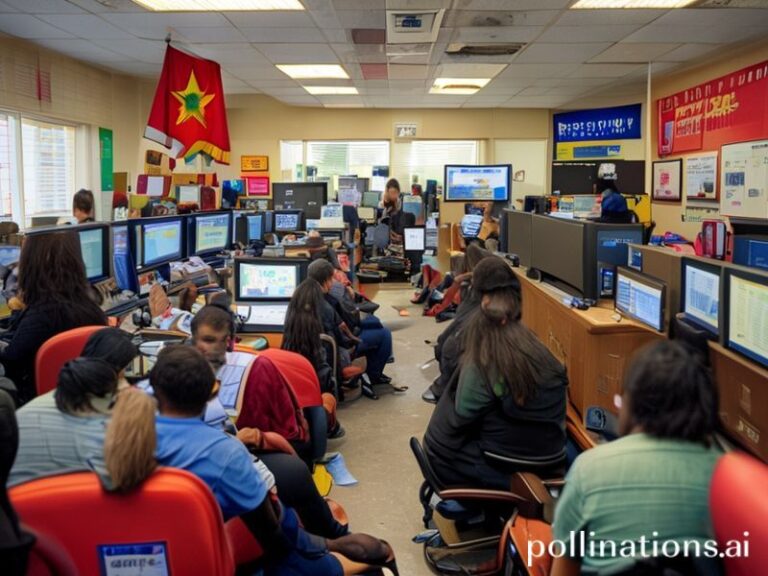World on Hold: How Ariana Grande’s Ticketmaster Queue Became a Global Flashpoint of Fandom, Finance, and Futile Hope
Ticketmaster’s Grande Collapse: How One Pop Star’s Tour Queue Became a Geopolitical Flashpoint
By Matteo “Machiavelli” Marchetti, Senior Correspondent for Dave’s Locker
LONDON—Across three continents this week, millions of citizens found themselves doing the exact same thing at the exact same moment: staring at a spinning wheel on an app that promised them a chance to scream “thank u, next” in unison with Ariana Grande in an arena somewhere warm enough for fishnets. From São Paulo to Singapore, the Ticketmaster queue for Grande’s 2025 “Eternal Delay” tour became the world’s most democratic—if involuntary—political assembly since the invention of the DMV.
Naturally, governments panicked. Brazil’s Ministry of Culture issued a statement reminding citizens that “music is a human right,” which sounds lovely until you remember it was translated from bureaucratese that originally read: “Please stop crashing our servers, we’re trying to host the Olympics again.” Meanwhile, South Korea’s Fair Trade Commission opened an antitrust probe faster than you can say “Blackpink could never,” and the EU’s Digital Services Act hotline lit up like a Christmas tree in Brussels, presumably staffed by interns Googling “What is an Ariana?” between espresso shots.
The numbers are almost poetic in their absurdity. Ticketmaster claims it registered 5.7 billion bot hits—roughly the global population if every human, including your dead great-uncle, decided to scalp floor seats. The company insists only 3% of hopefuls snagged tickets, which is a polite way of saying 97% of the planet was collectively ghosted harder than a situationship in 2019. In Nigeria, university students created a meme comparing the queue to the national immigration website; in Poland, a right-wing tabloid blamed “globalist ticketing cartels” for youth unrest. Somewhere in Canada, a junior diplomat drafted a cable titled “Soft Power Implications of Pop Star Fandom: A Threat Assessment,” then drank an entire bottle of maple whisky.
But beneath the snark lies a darker economic parable. Ticketmaster’s dynamic pricing algorithm—think Uber surge pricing but for feelings—spotted demand spikes and jacked nosebleeds to $950 faster than a hedge fund shorting the yen. The result? An instant wealth transfer from teenagers in Jakarta to shareholders in Delaware, proving once again that capitalism can monetize literally anything, including the sound of your own disappointment. When Argentina’s peso wobbled last month, local economists half-joked that Grande tickets were the new blue-chip asset class. (They weren’t wrong; StubHub listings now trade at a 40% premium to sovereign bonds.)
Geopolitically, the meltdown exposed a brittle digital infrastructure nobody admits we built. When servers in Virginia hiccupped, the queue froze from Reykjavík to Riyadh, reminding us that the cloud is just someone else’s basement. The UN’s Internet Governance Forum issued a stern communiqué about “critical cultural infrastructure,” which is UN-speak for “We, too, wanted tickets.” Even China’s Great Firewall trembled: Weibo censors scrambled to delete screenshots of the queue timer set to 999+ minutes, lest citizens connect the dots between concert scarcity and, well, everything else.
And so we arrive at the inevitable conclusion: the world didn’t end with a bang or a whimper, but with 100 million people screaming into their phones in 37 languages, all subtitled by the same buffering wheel. Ariana Grande—an artist whose brand is literally gratitude—has accidentally united the planet in shared, seething resentment. Somewhere in Geneva, the WHO is quietly adding “post-ticket trauma” to the ICD-11, while therapists in Stockholm report a 300% spike in patients describing existential dread triggered by the phrase “refresh page.”
In the end, the tour will happen, the resale market will flourish, and a lucky few will film 30-second clips that’ll net them more views than most foreign correspondents. The rest of us will scroll past them on mute, nursing the quiet, global hangover of knowing that the same system that can’t sell you a pop concert ticket without catastrophe is also in charge of, say, nuclear codes. Sleep tight, planet Earth—your queue position is 2,147,483,647, and the estimated wait time is infinity plus one.







